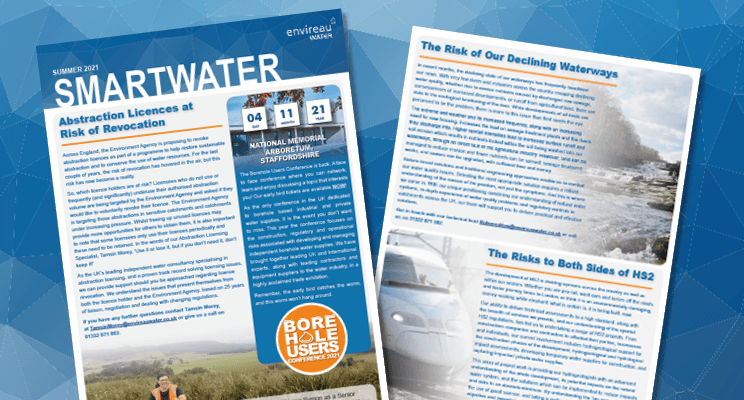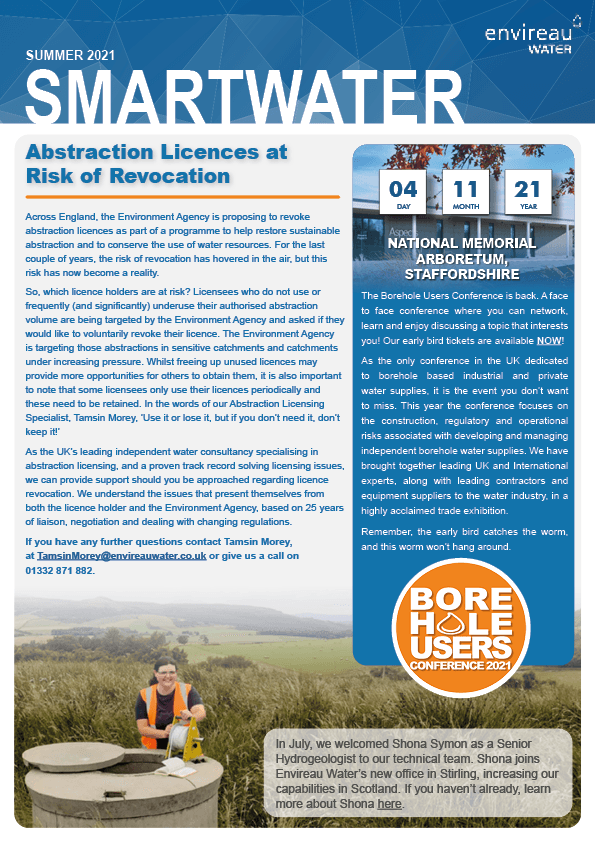Summer SmartWater 2021
August 24, 2021
Are you interested to find out what’s been keeping our team busy over the summer months? Take a read of our Summer SmartWater issue to learn about some of the topics our team have been supporting. With a very real risk of abstraction licence revocation to some abstraction licence holders, declining water quality in our waterways, and HS2 posing water risks to many individuals, businesses, construction companies and contractors across the country, if you are affected by any of these risks, then this is the SmartWater you want to read.
On top of all that, our annual Borehole Users Conference is fast approaching. Take a read to learn more about our theme ‘risk’ and grab your early bird ticket before it’s too late!
Read the newsletter here:

By Rachael Plant
•
November 6, 2025
You may have seen our recent spotlight on the challenges currently facing UK agriculture. However, these issues are not limited to one sector; they represent a wider, shared challenge for industries across the country. As the countdown continues and the momentum builds to our upcoming conference, Beyond Drought: From Risk to Resilience , we spoke to Principal Hydrogeologist, Shona Symon , regarding the growing pressures facing our food and drink industry. Shona, given the ongoing drought declarations and recurrent warm weather experienced, could you provide us with an overview of the challenges facing those in the food and drink industry? 'Absolutely. Given the rapidly shifting nature of the UK climate, it is easy to focus on the immediate issues this has on our water resources, such as reduced surface flows and impacts to surface environment. However, as you will have noticed, the problems don't stop when the rain returns, and the damage left behind can be significant and increasingly difficult to combat.

By Rachael Plant
•
October 23, 2025
As the threat of climate change continues to increase, the frequency of extreme weather events is rising across the UK. With wetter winters but warmer, drier summers expected to persist, the risk of drought will grow, creating significant challenges nationwide. While the UK climate can be unpredictable, the impact of drought is evident and cannot be ignored. Following several drought declarations and water restrictions enforced throughout 2025, farmers across the UK continue to contend with drained reservoir levels and heightened demand for irrigation, resulting in lower crop yields, fragile water sources, and growing concern about the future of British agriculture. Our team of water resource experts has been working within the agricultural industry for many years, supporting the implementation and management of sustainable water resources. We asked Principal Water Resources Specialist, Tamsin Morey , for her thoughts. Tamsin, what danger is the UK farming industry already experiencing?

By Rachael Plant
•
September 25, 2025
Envireau Water are thrilled to have contributed to the recent successful planning application for the construction of a community bike park in Richmond, North Yorkshire. Louise Raine, a local to the area, first set up the campaign after realising there were no 'safe and purpose-built spaces' for her children and other families. In collaboration with the local community and town council, Envireau Water volunteered to provide high-level technical support on flood risk and drainage solutions, following concerns raised by a lead regulatory authority. Hydrologists, Mairi , Lee , and Michael conducted a review of flood risk, drainage pathways and soil infiltration potential. Upon developing the drainage strategy and producing pre- and post-development 2D runoff modelling, it was discovered that the proposed location had no significant risk. By investigating the soil types and overland flow pathways, it was also noted that the suggested drainage strategy would have both a flood risk benefit and an environmental benefit of enhancing the ecology and biodiversity of the land.

By Rachael Plant
•
November 6, 2025
You may have seen our recent spotlight on the challenges currently facing UK agriculture. However, these issues are not limited to one sector; they represent a wider, shared challenge for industries across the country. As the countdown continues and the momentum builds to our upcoming conference, Beyond Drought: From Risk to Resilience , we spoke to Principal Hydrogeologist, Shona Symon , regarding the growing pressures facing our food and drink industry. Shona, given the ongoing drought declarations and recurrent warm weather experienced, could you provide us with an overview of the challenges facing those in the food and drink industry? 'Absolutely. Given the rapidly shifting nature of the UK climate, it is easy to focus on the immediate issues this has on our water resources, such as reduced surface flows and impacts to surface environment. However, as you will have noticed, the problems don't stop when the rain returns, and the damage left behind can be significant and increasingly difficult to combat.

By Rachael Plant
•
October 23, 2025
As the threat of climate change continues to increase, the frequency of extreme weather events is rising across the UK. With wetter winters but warmer, drier summers expected to persist, the risk of drought will grow, creating significant challenges nationwide. While the UK climate can be unpredictable, the impact of drought is evident and cannot be ignored. Following several drought declarations and water restrictions enforced throughout 2025, farmers across the UK continue to contend with drained reservoir levels and heightened demand for irrigation, resulting in lower crop yields, fragile water sources, and growing concern about the future of British agriculture. Our team of water resource experts has been working within the agricultural industry for many years, supporting the implementation and management of sustainable water resources. We asked Principal Water Resources Specialist, Tamsin Morey , for her thoughts. Tamsin, what danger is the UK farming industry already experiencing?

By Rachael Plant
•
September 25, 2025
Envireau Water are thrilled to have contributed to the recent successful planning application for the construction of a community bike park in Richmond, North Yorkshire. Louise Raine, a local to the area, first set up the campaign after realising there were no 'safe and purpose-built spaces' for her children and other families. In collaboration with the local community and town council, Envireau Water volunteered to provide high-level technical support on flood risk and drainage solutions, following concerns raised by a lead regulatory authority. Hydrologists, Mairi , Lee , and Michael conducted a review of flood risk, drainage pathways and soil infiltration potential. Upon developing the drainage strategy and producing pre- and post-development 2D runoff modelling, it was discovered that the proposed location had no significant risk. By investigating the soil types and overland flow pathways, it was also noted that the suggested drainage strategy would have both a flood risk benefit and an environmental benefit of enhancing the ecology and biodiversity of the land.

By Rachael Plant
•
July 22, 2025
We are excited to welcome Dr Anna Hitchmough to our growing team, who recently joined Envireau Water as a Principal Technical Specialist. With over 25 years of consultancy experience in hydrogeology, Anna brings a wealth of expertise to our team. Anna joins us from Carbon Zero Consulting/RSK Geosciences, where her career has centred around ground-source heat pump systems. In her most recent role, Anna chaired RSK's Heat Decarbonisation Working Group and Hydrogeology Working Group. Anna brings extensive experience in quantitative risk assessments and NAPL characterisation and has completed significant work on several contaminated land projects, having previously served as Chair of the Geological Society's Contaminated Land Group. Anna's academic background stems from the University of Newcastle where she completed an MSc in Hydrology, followed by a PhD in Hydrogeology at the University of Birmingham. She is also a chartered geologist.





